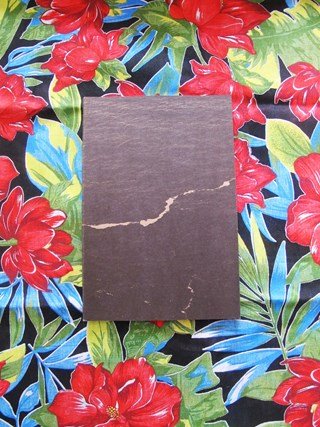 Image 1 of 6
Image 1 of 6

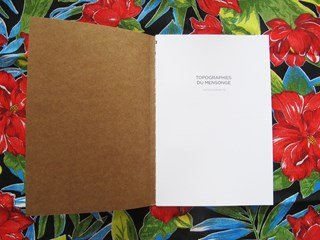 Image 2 of 6
Image 2 of 6

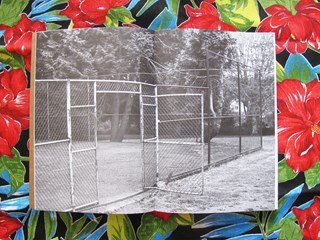 Image 3 of 6
Image 3 of 6

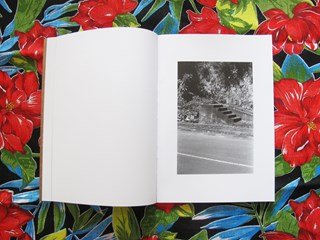 Image 4 of 6
Image 4 of 6

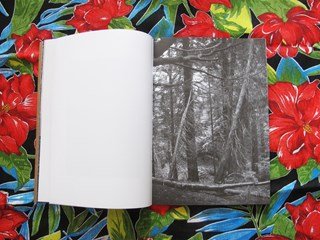 Image 5 of 6
Image 5 of 6

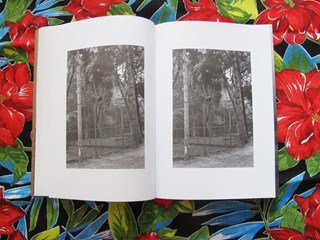 Image 6 of 6
Image 6 of 6







Topographies du mensonge / Sue-Elie Andrade-Dé
"The title of the Thomas Mann’s novel ‘The Magic Mountain’ from an excerpt of ‘The Birth of Tragedy’ (1870-71) in which Nietzsche says, «the Olympian magic mountain opens itself before us, showing its very roots… ». The German philosopher, believed that while we climb mountains we have a clear understanding of what life is. The misadventures of the climb would be precisely the difficulties, pain, problems, mistakes and misfortunes that we face. The path of ascent is marked along the way by moments of satisfaction interspersed with these “stones”, yet compensated by the general effort. Metaphorically he spoke of human existence as a pilgrimage, a walk, a journey.
A pilgrimage coincides not only with the act of walking, or the execution of a path of a certain number of miles; it is recognized that a pilgrimage must be motivated “by” or “for” something.
The first photobook, 'Topographies du mensonge’ by the artist Sue-Elie Andrade-Dé is about this pilgrimage. In particular, an unresolved family situation that leads on a trip to the birthplace of her father. Isolation, reconciliation and a need for understanding after a discovery that opens a crack in the crust creates a bridge between present and past. The reopening of a wound as a space for an immediate and profound change.
The result of such a journey is a rich work, full of paths and layers. It is the impossibility of narrating a time that has just begun and that still can not be fully understood. Perhaps it’s just a chance for pointing out how much more lucid it is to seek meanings in the future rather than in the past. Or perhaps just to wonder if the act of seeking still makes sense."
Text by Renata Scovino
"The title of the Thomas Mann’s novel ‘The Magic Mountain’ from an excerpt of ‘The Birth of Tragedy’ (1870-71) in which Nietzsche says, «the Olympian magic mountain opens itself before us, showing its very roots… ». The German philosopher, believed that while we climb mountains we have a clear understanding of what life is. The misadventures of the climb would be precisely the difficulties, pain, problems, mistakes and misfortunes that we face. The path of ascent is marked along the way by moments of satisfaction interspersed with these “stones”, yet compensated by the general effort. Metaphorically he spoke of human existence as a pilgrimage, a walk, a journey.
A pilgrimage coincides not only with the act of walking, or the execution of a path of a certain number of miles; it is recognized that a pilgrimage must be motivated “by” or “for” something.
The first photobook, 'Topographies du mensonge’ by the artist Sue-Elie Andrade-Dé is about this pilgrimage. In particular, an unresolved family situation that leads on a trip to the birthplace of her father. Isolation, reconciliation and a need for understanding after a discovery that opens a crack in the crust creates a bridge between present and past. The reopening of a wound as a space for an immediate and profound change.
The result of such a journey is a rich work, full of paths and layers. It is the impossibility of narrating a time that has just begun and that still can not be fully understood. Perhaps it’s just a chance for pointing out how much more lucid it is to seek meanings in the future rather than in the past. Or perhaps just to wonder if the act of seeking still makes sense."
Text by Renata Scovino
"The title of the Thomas Mann’s novel ‘The Magic Mountain’ from an excerpt of ‘The Birth of Tragedy’ (1870-71) in which Nietzsche says, «the Olympian magic mountain opens itself before us, showing its very roots… ». The German philosopher, believed that while we climb mountains we have a clear understanding of what life is. The misadventures of the climb would be precisely the difficulties, pain, problems, mistakes and misfortunes that we face. The path of ascent is marked along the way by moments of satisfaction interspersed with these “stones”, yet compensated by the general effort. Metaphorically he spoke of human existence as a pilgrimage, a walk, a journey.
A pilgrimage coincides not only with the act of walking, or the execution of a path of a certain number of miles; it is recognized that a pilgrimage must be motivated “by” or “for” something.
The first photobook, 'Topographies du mensonge’ by the artist Sue-Elie Andrade-Dé is about this pilgrimage. In particular, an unresolved family situation that leads on a trip to the birthplace of her father. Isolation, reconciliation and a need for understanding after a discovery that opens a crack in the crust creates a bridge between present and past. The reopening of a wound as a space for an immediate and profound change.
The result of such a journey is a rich work, full of paths and layers. It is the impossibility of narrating a time that has just begun and that still can not be fully understood. Perhaps it’s just a chance for pointing out how much more lucid it is to seek meanings in the future rather than in the past. Or perhaps just to wonder if the act of seeking still makes sense."
Text by Renata Scovino
2015
Selfpublisehd
64 pages
25,2 x 14,8 cm
Softcover
Offset Print
First Edition
ISBN 978-2-9551312-0-6
